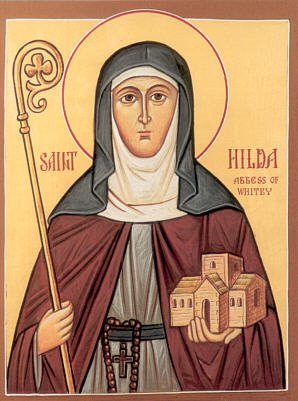|
Συναξαριστής |
17 Νοεμβρίου όνομα: ΧΙΛΝΤΑ (Χίλντα) |
 |
| St. Hilda, Abbess of Whitby (680) A noble kinswoman of St Edwin, king of Northumbria (commemorated October 12), Hilda was baptized at a young age through the preaching of St Paulinus, one of the first missionaries sent from Rome to British Isles. At the age of thirty-three she renounced the world and entered monastic life. At first, she sought to enter a monastery near Paris in Gaul, but she was called back to her homeland by St Aidan, Bishop of Lindisfarne (August 31), who, discerning her already-apparent spiritual gifts, set her as Abbess of a small monastery. As her gifts of discernment and spiritual guidance became more widely-known, she led larger monasteries, finally establishing the Monastery of Whitby in 657. The Saint spent the next thirty-three years directing the Monastery, which became a beacon of Christian life throughout the British Isles and beyond. The Monastery was unusual by modern standards in that it comprised both a women's and a men's monastic house, with Mother Hilda as spiritual head of both. The community became a training-ground for priests and bishops who went on to spread the Gospel of Christ throughout Britain. Commoners, kings and Bishop Aidan himself came regularly to her for spiritual counsel, and she was in her own lifetime regarded as the Mother of her country. For the last six years of her life she was afflicted with an unremitting burning fever, but she continued her holy work undeterred until her repose in 680. At the moment of her death, Saint Begu, in a different monastery, was awakened by a vision of Hilda's soul being borne up to heaven by a company of angels. The Synaxarion concludes, "Saint Hilda, like her contemporaries Saint Etheldreda (23 June) and Saint Ebba (25 Aug.), belongs to that monastic company of women of royal birth who exercised a formative influence in the English Church of the seventh century, but she is also a rare example of a spiritual Mother, who received from God the gift of directing not only nuns but monks and bishops as well; for in the Lord Jesus there is neither male nor female, but a new creation (Gal. 3:28)." Apolytikion in the Plagal of the Fourth Tone The image of God, was faithfully preserved in you, O Mother. For you took up the Cross and followed Christ. By Your actions you taught us to look beyond the flesh for it passes, rather to be concerned about the soul which is immortal. Wherefore, O Holy Hilda, your soul rejoices with the angels. Kontakion in the First Tone For three and thirty years in the world, chaste and modest, for three and thirty years as a righteous monastic, thou camest, O Hilda, unto Christ's stature, and perfect man; and on being cleansed through grievous bodily sickness, thou wast taken up in light and glory to Heaven, Where thou dost pray God for us. |
| τέλος παράθεσης |
Οροι Χρήσης του κόμβου μας
|
Προστασία Προσωπικών Δεδομένων
|
 το γκρουπ μας στο FB
το γκρουπ μας στο FB
Copyright © www.eortologio.gr All Rights Reserved.
Copyright © www.eortologio.gr All Rights Reserved.
λέξεις για αποδελτίωση: εορτολόγιο, εορτολογιο, ΕΟΡΤΟΛΟΓΙΟ, γιορτη, γιορτή, ΓΙΟΡΤΗ, εορτή, εορτη, ΕΟΡΤΗ, συναξαριστής, συναξαριστης, συναξάρι, συναξαρι, γιορτάζει, γιορταζει, γιορτεσ, γιορτέσ, ποιός γιορτάζει, πότε γιορτάζει, ποιος γιορταζει, ποτε γιορταζει, υπολογισμός, κινητές, γιορτές, κινητες, γιορτες, κινητή, γιορτή, κινητη, γιορτη, κινητών, γιορτών, κινητων, γιορτων, ονομαστική, ονομαστικές, ονομαστικη, ονομαστικες, ονομαστικών, ονομαστικων, Πάσχα, Πασχα, αργίες, αργιες, orthodox, greek namedays, name day, pote giortazo, pote giortazei